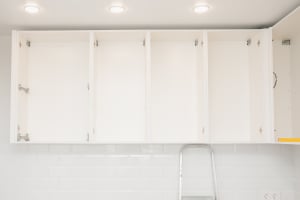Solid wood doors are relatively efficient when it comes to energy conservation, but more modern alternatives such as solid core, vinyl, and even steel are superior in this regard.
Ensuring that your home remains warm during the cold winter months and cool during the hot summer months is one of the best ways of ensuring that it remains energy efficient. This is because the less you have to use your air conditioning and heater, the lower your energy bills will be. The doors of your home play an important part in this, even if they are classic interior doors.
That said, there are several benefits to having solid wood doors, and in this piece, we will look at whether or not they are energy efficient.
The short and straightforward answer to this question is–yes. Some homeowners undertake remodeling projects to get new solid wooden doors once they know they don’t need a permit to install an interior door. When you consider the fact that about 80% of the energy used in a household goes to heating, it becomes clear how important it is for you to take the necessary steps to ensure your home is energy efficient.
Another critical element when it comes to energy conservation in a home is sizing and ordering interior doors. Most people don’t realize that the heat in your home can easily be lost through poorly insulated doors and windows. Energy-efficient solid wood doors are designed to offer quality insulation and can have draft-proofing and sealing properties, which do not allow any warmth to escape. If you want, you can even purchase wood doors that comply with Part L building regulations, which are focused on conserving fuel and power.
These doors are made using the highest quality standards and materials, which helps to ensure every homeowner who gets them enjoys their energy-saving properties for years to come.
Other Factors That Can Affect Energy Efficiency
Type of Wood
When trying to determine how energy efficient your wooden doors are, it is critical that you first look at the kind of wood used to make them. In most cases, thick hardwood species are suitable for energy conservation as they allow less energy leakage via drafts. In simpler terms, the more solid the wood, the better it will be at conserving energy. Some of the more popular types include cedar, mahogany, knotty alder, and poplar, all of which are ideal for exterior wooden doors.
Insulation Capabilities
Compared to non-natural materials like metal and fiberglass, wooden doors do not have airtight characteristics. However, they tend to offer some level of insulation while still allowing for a unique overall design of the home. Anyone looking for style and a reliable level of insulation will find wooden doors work for them by ensuring their home looks good and is still energy efficient.
Despite not being as suitable as other doors designed specifically for energy efficiency, there are still a couple of ways you can adjust solid wood doors to make things better on your pocket. For instance, you can get some weather strips and place them between your arched wooden door and the frame to prevent heat loss. You can also upgrade the bottom section with a door sweep or foam to help improve energy efficiency in your home.
In Summary
Even though wooden doors are not at the top of the list for promoting energy efficiency in the home, they still have a wide range of benefits and can be made or altered to have better insulation features. For those concerned about the look of their home as well as its energy efficiency, you can’t go wrong with solid wood.













